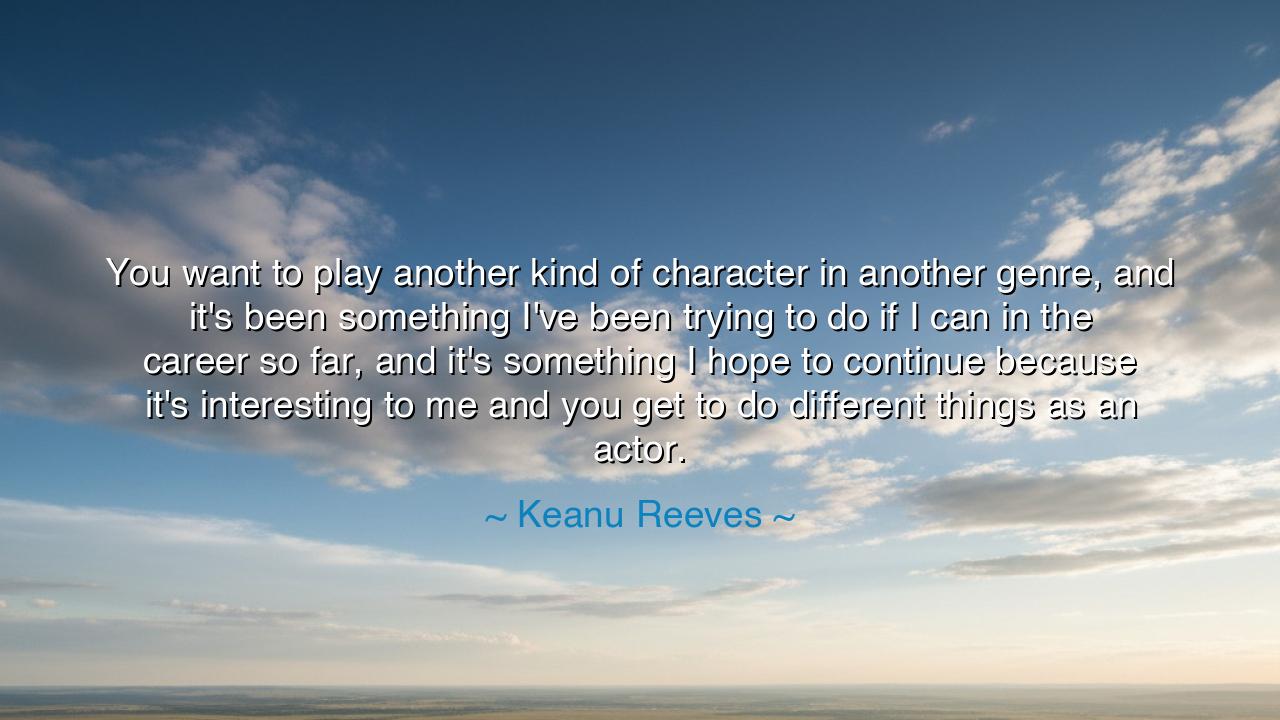
You want to play another kind of character in another genre, and
You want to play another kind of character in another genre, and it's been something I've been trying to do if I can in the career so far, and it's something I hope to continue because it's interesting to me and you get to do different things as an actor.






“You want to play another kind of character in another genre, and it's been something I've been trying to do if I can in the career so far, and it's something I hope to continue because it's interesting to me and you get to do different things as an actor.”
Thus spoke Keanu Reeves, a man whose craft has crossed the boundaries of worlds—romance, comedy, tragedy, and myth. In this quiet reflection, he reveals the essence of an artist’s journey: the endless search for transformation, for new experience, for the uncharted path. To play another kind of character is not only an act of performance, but an act of self-discovery. Reeves speaks here as the philosopher of motion, the wanderer of stories, teaching that growth requires the courage to change, to risk failure, and to meet the unknown with open hands.
The origin of this thought lies in Reeves’s own odyssey through cinema and life. From the youthful dreamer in Bill & Ted’s Excellent Adventure to the stoic warrior of John Wick, he has lived many lives before the eyes of the world. Yet what drives him, as his words reveal, is not fame nor comfort, but the longing to explore the human condition in its countless forms. Each role becomes a mirror, reflecting a new facet of the soul. Through every transformation, he seeks to remain alive within his art, to keep his spirit from hardening into repetition. For what is creativity if not the refusal to stand still?
In Reeves’s philosophy, art imitates life, and life, too, must follow this principle of renewal. The actor who repeats the same part becomes a shadow of himself, just as the man who fears change ceases to grow. Reeves reminds us that to live fully, one must step beyond the familiar—the same way an artist must leave the comfort of the roles he has mastered. Each new genre, each new character, is a kind of rebirth, a shedding of the old self to make room for the next. Through this cycle of creation and surrender, the soul learns its own depth.
Consider the example of Leonardo da Vinci, that eternal seeker of knowledge. He, too, refused to be confined to one art or science. Painter, inventor, anatomist, philosopher—he wandered across disciplines as Reeves wanders across genres. Both men share the same truth: that curiosity is the fire that keeps the human spirit alive. To do only what is known is to dwell in comfort, and comfort is the slow death of greatness. To live well is to seek variation, to embrace the discomfort of the unknown and find wisdom in the journey.
Yet Reeves’s words carry not arrogance but humility. He does not claim mastery, only interest—the wonder of a student who knows that the craft is larger than the self. The phrase “it’s interesting to me” speaks of reverence, of the joy of learning. In every performance, in every challenge, there is a lesson: about empathy, about discipline, about endurance. The actor’s path is not unlike the philosopher’s—it is a dialogue between the inner and outer worlds, between what is imagined and what is real. To act well is to live consciously.
And though he speaks of acting, Reeves speaks also to all who labor in the art of living. The farmer who experiments with a new crop, the writer who dares a new form, the soul who ventures beyond fear—they all embody his wisdom. Life, like art, demands evolution. The spirit that clings to one identity, one comfort, one genre of existence, grows stagnant. But the one who keeps moving, who seeks new roles and perspectives, remains young, vital, and awake.
So hear this lesson, O seeker of truth: do not become your last success. Change your role before time changes it for you. Seek new experiences, learn new songs, walk strange roads. For as Keanu Reeves teaches, the joy of existence lies not in perfection, but in exploration. Be as the actor upon the stage of life—willing to play, to fall, to rise again, always searching for what is new and true. For the man who dares to live many lives within one will never die incomplete.






AAdministratorAdministrator
Welcome, honored guests. Please leave a comment, we will respond soon